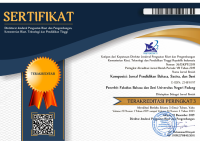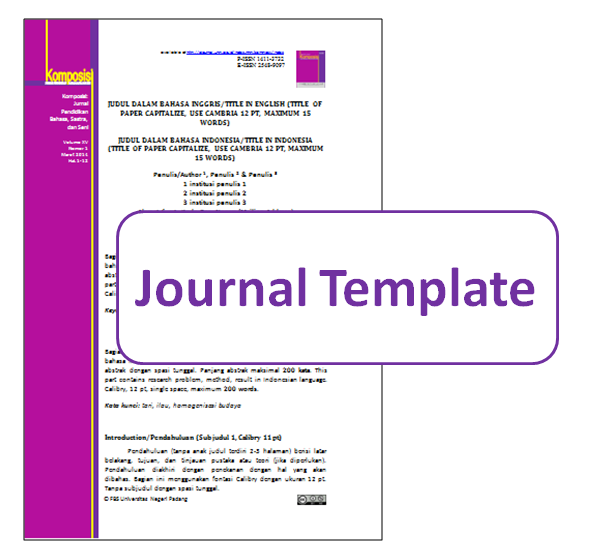Does Video Dubbing Project Affect EFL Students' Self-Efficacy and Proficiency in English?
Abstract
Video Dubbing, or adding translated dialogues into a film or series, has been applied as a learning method in EFL speaking courses. Students can download videos from any platform and record their voice-overs in English. Previous research primarily studied the effect on students' skills. The impact on motivation, confidence, and self-efficacy is still worth exploring. Therefore, this research examined the effectiveness of the Video Dubbing Project on EFL students' self-efficacy and proficiency in speaking. This research design is Mixed-methods, which are pre-experiment and descriptive qualitative. The subjects were 38 students in grade 9 of junior high school in Situbondo, Indonesia. The result showed that it was significantly effective in improving self-efficacy and proficiency. However, based on the qualitative data, this project was simple for proficient students, but for those with low self-efficacy, the absence of a requirement to show their faces on camera empowered them to attempt this project. Upon completing their videos, they often express surprise and satisfaction by saying, "Turns out! I can speak English."
Keywords
Full Text:
PDFReferences
Almohammadi, M. M. (2023). A Decade of EFL Self-Efficacy Research: Empirical Status and Future Directions. English Language Teaching, 16(7), 91. https://doi.org/10.5539/elt.v16n7p91
Asakereh, A., & Dehghannezhad, M. (2015). Student satisfaction with EFL speaking classes: Relating speaking self-efficacy and skills achievement. Issues in Educational Research, 25(4), 345–363.
Bandura, A. (1978). Self-efficacy: Toward a unifying theory of behavioral change. Advances in Behaviour Research and Therapy, 1(4), 139–161. https://doi.org/10.1016/0146-6402(78)90002-4
Chang, Y. C., & Tsai, Y. T. (2022). The Effect of University Students’ Emotional Intelligence, Learning Motivation and Self-Efficacy on Their Academic Achievement—Online English Courses. Frontiers in Psychology, 13(February), 1–11. https://doi.org/10.3389/fpsyg.2022.818929
Cresswell, J. W., Plano-Clark, V. L., Gutmann, M. L., & Hanson, W. E. (2003). Advanced mixed methods research designs. In Handbook of Mixed Methods in Social and Behavioral Research.
Dubbing video (Procedure text) Grade 9 Students. (n.d.). Retrieved October 23, 2024, from https://www.youtube.com/watch?v=nTea5tA99iA
Fan, X. (2022). The development of EFL Learners’ willingness to communicate and self-efficacy: The role of flipped learning approach with the use of social media. Frontiers in Psychology, 13(October), 1–12. https://doi.org/10.3389/fpsyg.2022.1001283
Hermagustiana, I., Astuti, A. D., & Sucahyo, D. (2021). Do I Speak Anxiously? A Correlation of Self-Efficacy, Foreign Language Learning Anxiety and Speaking Performance of Indonesian EFL Learners. Script Journal: Journal of Linguistics and English Teaching, 6(1), 68–80. https://doi.org/10.24903/sj.v6i1.696
Huang, H.-T. D. (2022). Investigating the influence of video-dubbing tasks on EFL learning. Language Learning & Technology26, 26(1), 1–20.
Ismailia, T., & Binarkaheni, S. (2022). Implementing a Video Project for Assessing Students’ Speaking Skills: A Case Study in a Non-English Department Context. Journal of English in Academic and Professional Communication, 8(1), 10–20. https://doi.org/10.25047/jeapco.v8i1.3878
Jalilvand, M., & Ghafournia, N. (2023). The Effect of Voice Recording, Video Dubbing, and Shadowing Tasks on the Pronunciation Ability: A Study of Iranian EFL Learners. Journal of Applied Linguistics Studies, 2(1), 74–85. https://jals.aliabad.iau.ir
Joni, D. A. A. W., & Wirastuti, I. G. A. P. (2018). Self-efficacy effect on basic level learners in speaking activities. Journal of Applied Studies in Language, 2(1), 1. https://doi.org/10.31940/jasl.v2i1.808
Li, J., Wang, C., & King, R. B. (2024). Which comes first? Modeling longitudinal associations among self-efficacy, motivation, and academic achievement. System, 121. https://doi.org/10.1016/j.system.2024.103268
Ma, L., Xiao, L., & Liu, J. (2021). Motivational beliefs of urban and rural students in English as a foreign language learning: the case of China. Journal of Multilingual and Multicultural Development, 0(0), 1–14. https://doi.org/10.1080/01434632.2021.1991933
Ma, Y. (2022). The triarchy of L2 learners’ emotion, cognition, and language performance: Anxiety, self-efficacy, and speaking skill in lights of the emerging theories in SLA. Frontiers in Psychology, 13(September), 1–9. https://doi.org/10.3389/fpsyg.2022.1002492
Riyanto, E. D. (2020). The Benefits of Integrating Video Making in a Speaking Class. English Language Teaching Educational Journal, 3(1), 64. https://doi.org/10.12928/eltej.v3i1.1850
Sumardi, S., ‘Adzima, R., & Wijaya, A. N. (2020). Digital Video Project: An Authentic Assessment to Assess Students’ Speaking Skills. Indonesian Journal of EFL and Linguistics, 5(1), 57. https://doi.org/10.21462/ijefl.v5i1.217
Tyas, N. K., & Fitriani, N. (2021). Enhancing Students Speaking Skills by Making Video Youtube TUTORIAL AS PROJECT BASED LEARNING. IDEAS: Journal on English Language Teaching and Learning, Linguistics and Literature, 9(2), 233–244. https://doi.org/10.24256/ideas.v9i2.2262
Wang, C., & Sun, T. (2020). Relationship between self-efficacy and language proficiency: A meta-analysis. System, 95. https://doi.org/10.1016/j.system.2020.102366
Zhang, X., Ardasheva, Y., & Austin, B. W. (2020). Self-efficacy and english public speaking performance: A mixed method approach. English for Specific Purposes, 59, 1–16. https://doi.org/10.1016/j.esp.2020.02.001
Zheng, C., Wang, L., & Chai, C. S. (2023). Self-assessment first or peer-assessment first: effects of video-based formative practice on learners’ English public speaking anxiety and performance. Computer Assisted Language Learning, 36(4), 806–839. https://doi.org/10.1080/09588221.2021.1946562
DOI: https://doi.org/10.24036/komposisi.v25i2.131113
Refbacks
- There are currently no refbacks.
Copyright (c) 2024 Komposisi: Jurnal Pendidikan Bahasa, Sastra, dan Seni

This work is licensed under a Creative Commons Attribution-NonCommercial 4.0 International License.
Komposisi: Jurnal Pendidikan Bahasa, Sastra, dan Seni, a peer-reviewed online journal in languages, literature, and arts education.
Printed ISSN 1411-3732, Online ISSN 2548-9097.
Currently, Komposisi: Jurnal Pendidikan Bahasa, Sastra, dan Seni is indexed by:











